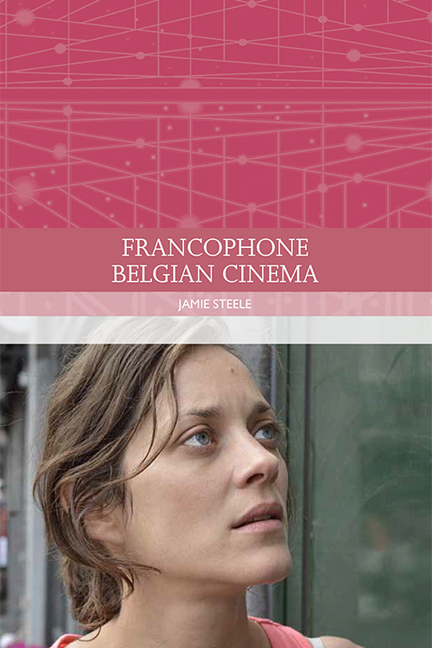Book contents
- Frontmatter
- Contents
- List of Figures
- Acknowledgements
- Traditions in World Cinema
- Introduction: Regional/National/Transnational Debates in Francophone Belgian Cinema
- 1 The (Francophone) Belgian Film Ecosystem: Trends in Production, Distribution and Exhibition
- 2 ‘No Future’: Social Marginalisation, Social Precariousness and Depictions of Seraing in Le gamin au vélo (Jean-Pierre and Luc Dardenne, 2011) and Deux jours, une nuit (Jean-Pierre and Luc Dardenne, 2014)
- 3 ‘Stills’ and Fragmented Families: Contemplating the Private Sphere in Joachim Lafosse’s Wallonia
- 4 From Slag Heaps to Cliffs: The ‘Marked’ Regional Landscape in Cages (Olivier Masset-Depasse, 2006)
- 5 The Francophone Belgian Road Movie: Eldorado (Bouli Lanners, 2008) and Ultranova (Bouli Lanners, 2005)
- 6 Lucas Belvaux’s Return: The Thriller Genre and Heists in Liège
- Conclusion
- Works Cited
- Films Cited
- Index
5 - The Francophone Belgian Road Movie: Eldorado (Bouli Lanners, 2008) and Ultranova (Bouli Lanners, 2005)
Published online by Cambridge University Press: 29 April 2021
- Frontmatter
- Contents
- List of Figures
- Acknowledgements
- Traditions in World Cinema
- Introduction: Regional/National/Transnational Debates in Francophone Belgian Cinema
- 1 The (Francophone) Belgian Film Ecosystem: Trends in Production, Distribution and Exhibition
- 2 ‘No Future’: Social Marginalisation, Social Precariousness and Depictions of Seraing in Le gamin au vélo (Jean-Pierre and Luc Dardenne, 2011) and Deux jours, une nuit (Jean-Pierre and Luc Dardenne, 2014)
- 3 ‘Stills’ and Fragmented Families: Contemplating the Private Sphere in Joachim Lafosse’s Wallonia
- 4 From Slag Heaps to Cliffs: The ‘Marked’ Regional Landscape in Cages (Olivier Masset-Depasse, 2006)
- 5 The Francophone Belgian Road Movie: Eldorado (Bouli Lanners, 2008) and Ultranova (Bouli Lanners, 2005)
- 6 Lucas Belvaux’s Return: The Thriller Genre and Heists in Liège
- Conclusion
- Works Cited
- Films Cited
- Index
Summary
In February 2016, the Cinémathèque Royale in Brussels dedicated a twomonth ‘Belgorama’ programme to the films of Bouli Lanners in the lead-in to the Berlinale release of Les premiers, les derniers/The First, the Last (Bouli Lanners, 2016). The ‘Belgorama’ strand provides a space for a celebration and valorisation of Belgian films and filmmakers, both French-speaking and Flemish, throughout Belgium's film history. For instance, in recent years, Emile-Georges de Meyst, Manu Bonmariage, Lydia Chagoll and producer Pierre Drouot amongst others have been included. The Lanners programme, however, is particularly salient to an analysis and interpretation of his corpus of work due to the incorporation of films that operate as intertexts in terms of stylistic filiation as well as attesting to Lanners’ presence as a veritable Belgian film and television star. The transnational context of Lanners’ stylistic filiation is neatly evidenced by the selection of Dersu Uzala (Akira Kurosawa, 1975) and Deliverance (John Boorman, 1972) to open the ‘Belgorama’ programme. As this chapter will later outline, Lanners’ cinephilic knowledge and cinéliteracy of the post-war European ‘art cinema’ canon and films by key auteurs in a global context adds a certain depth to the filmmakers’ use of static, long takes and road movie references.
Lanners’ pre-cinema and television background is also crucial to take into consideration at this point, since the filmmaker initially trained as a painter at the prestigious Acadèmie des Beaux-Arts in Liège. The painterly filiation is evident in his filmmaking style, as Lanners notes, ‘painting is always present when I film. Every time I create a frame that is aesthetically pleasing, it represents a tableau that I had always wanted to complete’ (Vlaeminckx and Feuillère 2008). As an ‘autodidact’, Lanners observes that his approach to filmmaking does not cohere with convention, stating that ‘by not having a film school background, I have not learnt to respect the standard rules of filmmaking’ (Lanners, in Vlaeminckx 2004: 17). His editing technique also appears as ad hoc and experimental, with Lanners noting that he analyses other filmmakers’ editing, and changes the technique ‘if it does not work’ (Lanners, in ibid.: 16). Lanners’ visual style is, therefore, created in relation to his cinephilic knowledge and his background working in front of the camera as an actor.
- Type
- Chapter
- Information
- Francophone Belgian Cinema , pp. 130 - 154Publisher: Edinburgh University PressPrint publication year: 2018



